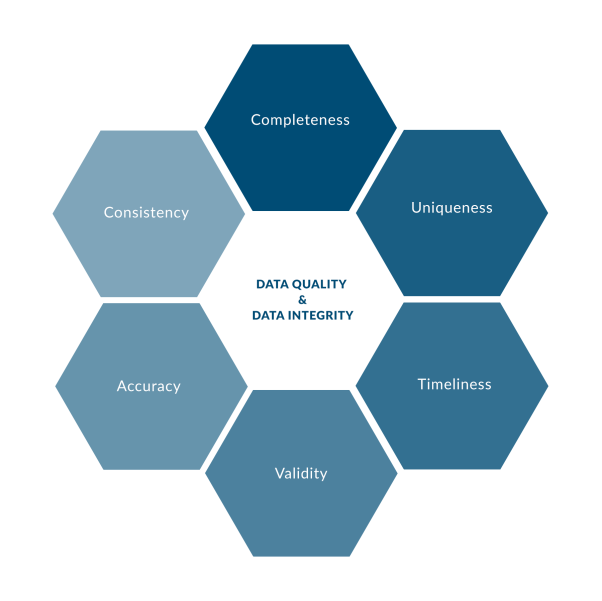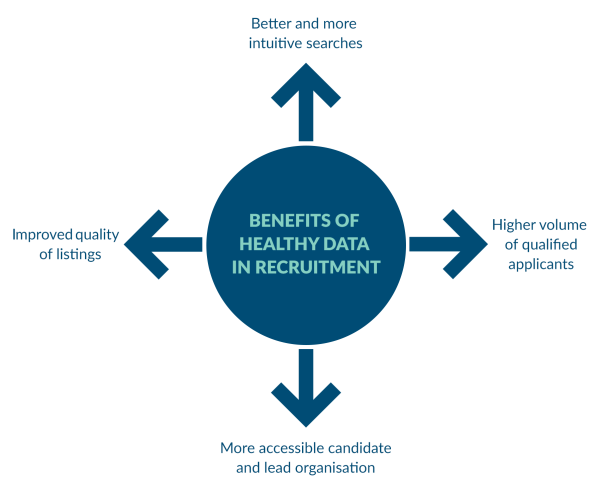With new technology and platforms coming out every year, it can be challenging for recruiters to keep up, especially when the tech used is incompatible with their datasets.
That’s because bad data can – and will – lead to frustration, or worse, mistakes and more expensive candidate acquisition cost… but good data? It can help keep costs low and streamline workflows.
What is Data Integrity in Recruitment?
Recruitment agencies generate a lot of data about their candidates, and clients but this data is sometimes too detailed and specific for the casual recruiter to look at.
As such, recruiters often rely on software to automate and manage their data which unfortunately puts them at a major disadvantage when it comes to knowing exactly what data is in their databases.
How do you measure the quality of data?
There are many ways to measure the quality of data. One way is to use a standard set of metrics developed by organisations such as the International Organization for Standardization (ISO) and the International Association For Data Quality, Governance and Analytics (IADQGA).
Core Aspects of Data Quality: Accuracy
Data could be collected without bias and validated by checking for potential errors but if the information was misinterpreted or was missing critical components, the results wouldn’t be accurate.
Core Aspects of Data Quality: Completeness
Completeness ensures all information entered into the database is correct and not missing information. For example, candidates must have a complete CV with accurate data for their application to be considered.
Completeness of data is essential because it ensures that the information entered into your recruitment technology stack is accurate.
Core Aspects of Data Quality: Consistency
Consistency means that all the parts of a dataset are aligned and make sense in relation to each other (e.g., different datasets should not contradict each other).
Consistency is achieved by ensuring that data is accurate and complete before it’s entered into a system or used to generate reports.
Core Aspects of Data Quality: Timeliness
Timeliness refers to how old the information is that you are working with; if it is more than one week old, then it will likely be out-of-date and, therefore, not very helpful in determining what would make a candidate successful in an opening you are trying to fill.
If your data is not up-to-date, it will lower its accuracy and be less useful as a resource for making decisions. Ensuring that your data is timely can help avoid this problem and ensure that you have accurate information when needed.
Core Aspects of Data Quality: Uniqueness
If data is not unique, there are duplicates somewhere else in the system, and they could disrupt various processes and cause miscommunication issues. If you do not have a precise representation of candidates and applicants, it will be challenging to find qualified candidates when they are needed.
Core Aspects of Data Quality: Validity
Validity means ‘the degree to which evidence and arguments are logically sound.’
It refers to how well a test measures what it set out to measure, so it’s important for employers when evaluating tools, software, platforms, and other innovations to take into account how well these new tools will measure their objectives before

How can recruiters maintain data integrity?
As a recruiter, you’ll need to work closely with a data verification service provider who can help you automate this process and when it comes to job seekers, you’ll want to look for third-party verification that the job seeker’s credentials are authentic.
An audit of all CV/resume data can tell you about a person’s skills, location, references and language. Check the CV for spelling, grammar and grammatical errors but most importantly, verify the candidate’s certifications and experience. This will give a high level of trust for the candidate and employers, ultimately making the recruitment process a lot smoother.
The importance of healthy data
Businesses need quality data to get the best results from the new software, tools, or platforms they leverage. The impact of high-quality datasets on productivity is evidenced by an increase in efficiency and accuracy when using new software, particularly recruitment tech.
Job-seekers need to trust that their information will be kept safe and employers need to know the data they’ve collected is accurate. To do this, it’s crucial recruiters clearly understand the quality and comprehensiveness of the data they are using and purge any damaged datasets.
How high-quality data maximizes ROI on recruitment tech
Healthy datasets maximise return on investment on your recruitment tech because artificial intelligence can source and display more accurate job descriptions, more efficient candidate searches, and better match candidates with employers.
With recruiting software, tools, and platforms, you can collect more data on your candidates and make better hiring decisions, saving time for both recruiters and agency owners. This free time also allows recruiters to focus on engaging with candidates and all the relevant information at their fingertips in an ease-of-use database.
The impact of high-quality datasets on productivity
A high-quality dataset is one of the most critical factors for a successful recruitment process. This includes collecting and storing data about candidates, job postings, and employer relationships. Without high-quality datasets, recruiters can’t produce accurate reports and analytics that can reflect their performance.
The need for quality data when implementing new software, tools, and platforms to your recruitment tech stack is crucial because it’s difficult to determine the effectiveness of these new products without the proper information.
For example, the recruiter may not know if they are getting better results with a tool or platform because they don’t have enough data to compare against what they had before.
What are some benefits of clean data?
In addition to healthy data being integral when implementing new software, tools, and platforms to your recruitment technology stack, other clean data pros are:

The usability of good data is endless
Data is the lifeblood of any business; it drives decision-making and helps us know where we stand on various metrics. For example, data can help you understand how many leads are coming in and how many have converted to clients.
The usability of good data is endless: it can help analyse trends, make predictions, and inform decisions. So what does this mean for you going forward?
Optimal Database Utilisation
By ensuring data is clean and healthy, recruiters can rely on their own internal CRMs to make high-quality placements as opposed to leveraging external – and therefore less cost-effective – sources.
Empower your recruiters and drastically lower the cost of candidate acquisition with clean data and a healthy CRM.
Want to streamline your datasets and have all of your candidate data in one centralised place? Find out how SourceBreaker can revolutionise the data you have and how you use it with powerful integrations!
TL;DR Key Takeaways
- Healthy data can help keep costs low and streamline workflows, while bad data can lead to frustration, mistakes, and more expensive candidate acquisition costs.
- Recruiters often rely on software to automate and manage their data, which puts them at a disadvantage when it comes to knowing exactly what data is in their databases.
- The quality of data can be measured by standards developed by organizations such as the International Organization for Standardization and the International Association For Data Quality, Governance and Analytics.
- The core aspects of data quality are accuracy, completeness, consistency, timeliness, uniqueness, and validity.
- To maintain data integrity, recruiters need to work closely with a data verification service provider who can help automate the process and verify candidates’ credentials.
- High-quality datasets maximise the return on investment on recruitment tech and can have a significant impact on productivity.
